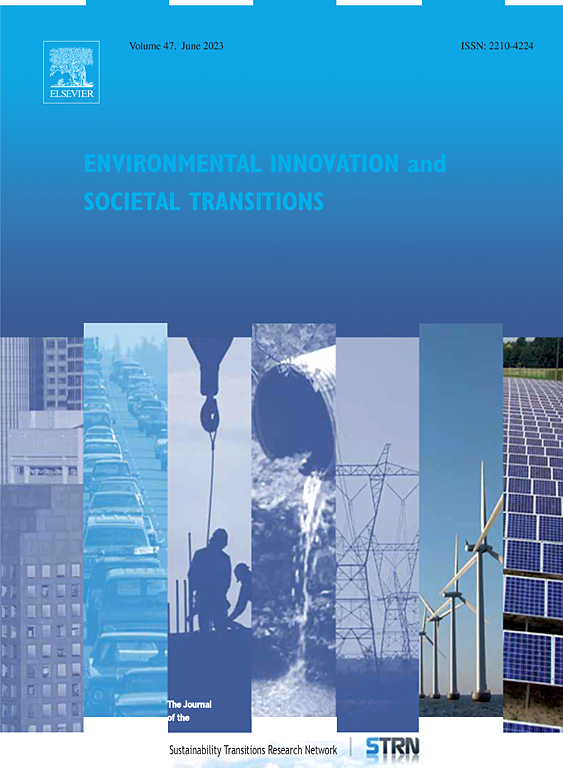The influence of disruptive events on energy-related household practices: Results of a longitudinal study in the Netherlands
IF 5.7
2区 经济学
Q1 ENVIRONMENTAL SCIENCES
Environmental Innovation and Societal Transitions
Pub Date : 2024-10-12
DOI:10.1016/j.eist.2024.100920
引用次数: 0
Abstract
Household energy use relates to our socio-cultural identity, our socio-economic status and the socio-cultural and material contexts in which we live. Around the world, households experienced dramatic changes in light of the COVID-19 pandemic and the drastic increase of energy prices following the Russian invasion of Ukraine. Habits and routines were disrupted, reinterpreted, reorganized and renegotiated, albeit under constraints and in most cases involuntarily. This paper analyses how the practice of ‘keeping warm’ responds to disruptive events ranging from a small-scale and short-lived experiment to much more drastic and far-reaching geopolitical events. Following an initial study challenging households to reduce temperatures inside their homes during October/November 2018, the same households were revisited for follow-up questioning two and a half years after the start of the COVID-19 pandemic in Europe and six months after the attack of Russian armed forces on Ukraine. Quantitative and qualitative data were collected before, during, and three months as well as three years after the original ‘heating challenge’. The final follow-up survey took place in August 2022 and turned the initial short-lived Living Lab-based experiment into a longitudinal study.
The experimental exploration of possibilities to reduce household energy use through the disruption of routinized practices in Living Labs enables an analysis of the effects of disruptive events, including the role of values, social norms, habits and routines (Sahakian et al., 2021). But what happens, when experiments get serious and large-scale upheaval affecting many challenges and changes meanings, thus contributing to changes in social norms and practices? This research explores lasting-changes in energy-related household practices following voluntary disruptive experimentation and subsequent involuntary disruptions. Compared to the macro-systemic disruptions experienced during the COVID-19 pandemic and the more recent energy crisis, the disruptions induced through the initial ‘heating challenge’ are of a much smaller magnitude. Our findings show that reductions in energy use are possible when routinized practices are disrupted through voluntary experimentation. In addition, our results indicate that the meanings tied up with indoor comfort had changed due to the initial experiment and that participants who initially experimented in an interactive community setting had learned more about how to connect, share experiences and reflections to adapt to other, also large-scale disruptions collaboratively.
破坏性事件对与能源有关的家庭行为的影响:荷兰纵向研究的结果
家庭能源使用与我们的社会文化身份、社会经济地位以及我们生活的社会文化和物质环境有关。在世界各地,由于 COVID-19 的流行和俄罗斯入侵乌克兰后能源价格的急剧上涨,家庭经历了巨大的变化。习惯和常规被打乱、重新解释、重组和重新协商,尽管是在受限的情况下,而且在大多数情况下是非自愿的。本文分析了 "保暖 "习俗如何应对各种破坏性事件,从小规模、短暂的实验到更为剧烈、影响深远的地缘政治事件。在 2018 年 10 月/11 月期间进行了一项挑战家庭降低室内温度的初步研究后,在欧洲 COVID-19 大流行开始两年半后和俄罗斯武装部队袭击乌克兰六个月后,再次访问了相同的家庭,进行了后续调查。在最初的 "供暖挑战 "之前、期间、三个月后以及三年后收集了定量和定性数据。最后的跟踪调查于 2022 年 8 月进行,将最初以生活实验室为基础的短暂实验变成了一项纵向研究。通过在生活实验室中打破常规做法,对减少家庭能源使用的可能性进行实验性探索,可以分析破坏性事件的影响,包括价值观、社会规范、习惯和常规的作用(Sahakian 等人,2021 年)。但是,当实验发生严重和大规模的动荡,影响到许多挑战并改变意义,从而导致社会规范和实践发生变化时,会发生什么呢?本研究探讨了在自愿破坏性实验和随后的非自愿破坏之后,与能源相关的家庭实践发生的持久变化。与 COVID-19 大流行和最近的能源危机期间所经历的宏观系统破坏相比,最初的 "供暖挑战 "所引发的破坏规模要小得多。我们的研究结果表明,通过自愿尝试来打破常规做法,是有可能减少能源使用量的。此外,我们的研究结果表明,与室内舒适度相关的意义已经因为最初的实验而发生了变化,而且最初在互动社区环境中进行实验的参与者已经更多地了解了如何联系、分享经验和反思,以共同适应其他同样大规模的干扰。
本文章由计算机程序翻译,如有差异,请以英文原文为准。
求助全文
约1分钟内获得全文
求助全文
来源期刊

Environmental Innovation and Societal Transitions
Energy-Renewable Energy, Sustainability and the Environment
CiteScore
13.60
自引率
19.40%
发文量
90
审稿时长
56 days
期刊介绍:
Environmental Innovation and Societal Transitions serves as a platform for reporting studies on innovations and socio-economic transitions aimed at fostering an environmentally sustainable economy, thereby addressing structural resource scarcity and environmental challenges, particularly those associated with fossil energy use and climate change. The journal focuses on various forms of innovation, including technological, organizational, economic, institutional, and political, as well as economy-wide and sectoral changes in areas such as energy, transport, agriculture, and water management. It endeavors to tackle complex questions concerning social, economic, behavioral-psychological, and political barriers and opportunities, along with their intricate interactions. With a multidisciplinary approach and methodological openness, the journal welcomes contributions from a wide array of disciplines within the social, environmental, and innovation sciences.
 求助内容:
求助内容: 应助结果提醒方式:
应助结果提醒方式:


